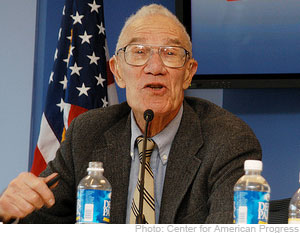 From an interview with the MIT Times.
From an interview with the MIT Times.
Q. Your research made clear how much technology can contribute to economic growth. To what extent might we see technology driving growth now?
A. I actually think the situation of the economy calls for a surge in technologically oriented investment. We have to expect consumer spending to be weak in our economy, not just for six months, but for the next few years. It will not be as strong a driving force as it has been the past several years. Something has to take its place. Government spending can’t, since government will have a hard time financing the inevitable deficits and is not in a position to aggressively increase its deficit spending.
That leaves two sources of expenditure to replace the pullback of consumers. One of those is net exports. That’s a long story. The other is business investment. We need business investment to support the economy. We have every reason to want to divert our resources toward secure and renewable sources of energy, new materials and environmental improvement. It’s our job, a place like MIT, to produce those new technologies, then it’s the job of private industry to grab them, but I also think it’s the job of the federal government to shift incentives, from incentives to consume more to incentives to invest more. Obama ran on this kind of platform, and if he can put some money behind that fundamentally correct view, he might generate something. It’s going to take more than that to replace 5 percent of GDP, but that would be a neat place to start.
This is also why I really worry about the reduction in funding for our great public universities. Michigan, Wisconsin, Berkeley, UT-Austin, etc. have long been wellsprings of ideas. Once upon a time in Wisconsin, I think the broader population understood why research was so important, particularly when the Ag School was discovering innovations that were useful for farmers. As a political matter, universities must connect to the broader community so that it understands why their research matters so much. Continuing American dominance in Noble Prizes certainly helps, but I don’t think the connection is sufficiently concrete for most taxpayers.
Photo: Center for American Progress
- Bulenox: Get 45% to 91% OFF ... Use Discount Code: UNO
- Risk Our Money Not Yours | Get 50% to 90% OFF ... Use Discount Code: MMBVBKSM
Disclaimer: This page contains affiliate links. If you choose to make a purchase after clicking a link, we may receive a commission at no additional cost to you. Thank you for your support!



Leave a Reply